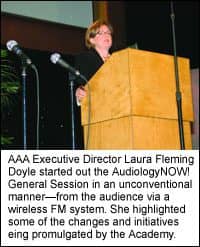Mead Killion, president and founder of Etymotic Research Inc, Elk Grove Village, Ill, has spent a good portion of his life studying hearing loss and developing ways to overcome it.
As his research and the research of others have shown, hearing loss is a slow, cumulative process that can happen unnoticed over a lifetime—until it is too late and the patient either is completely deaf or has severe hearing loss requiring a hearing instrument to correct it.
Typically, hearing loss is a result of continuous exposure to loud noise, which kills the hair cells in the ear. Once those cells die, they cannot be regenerated. The average human being begins their life with about 20,000 of these hair cells. Loud noise, for instance in a burst of about 116 decibels, will kill about 150 hair cells. On balance, this is not many and will go unnoticed by the average person, but eventually it adds up. “You can lose about 3,000 to 4,000 hair cells without too much problem, but after that it becomes insidious,” Killion explains.
Killion adds that if a person begins by just losing one hair cell a day when they are 10 years old, by the age of 65 they will have no hair cells left and be completely deaf.
Animal research has shown that, when exposed to loud noises, the hair cells take on the consistency of spaghetti, says Killion. And this research has also shown that if the sound is stopped immediately, not all of these damaged cells will die. A certain percentage will remain. But the best strategy is to avoid or minimize loud noise exposure as much as possible. “Most hearing loss is noise-related,” says Killion. “And because of that, you can end up with a real problem.”




